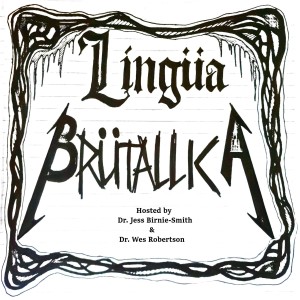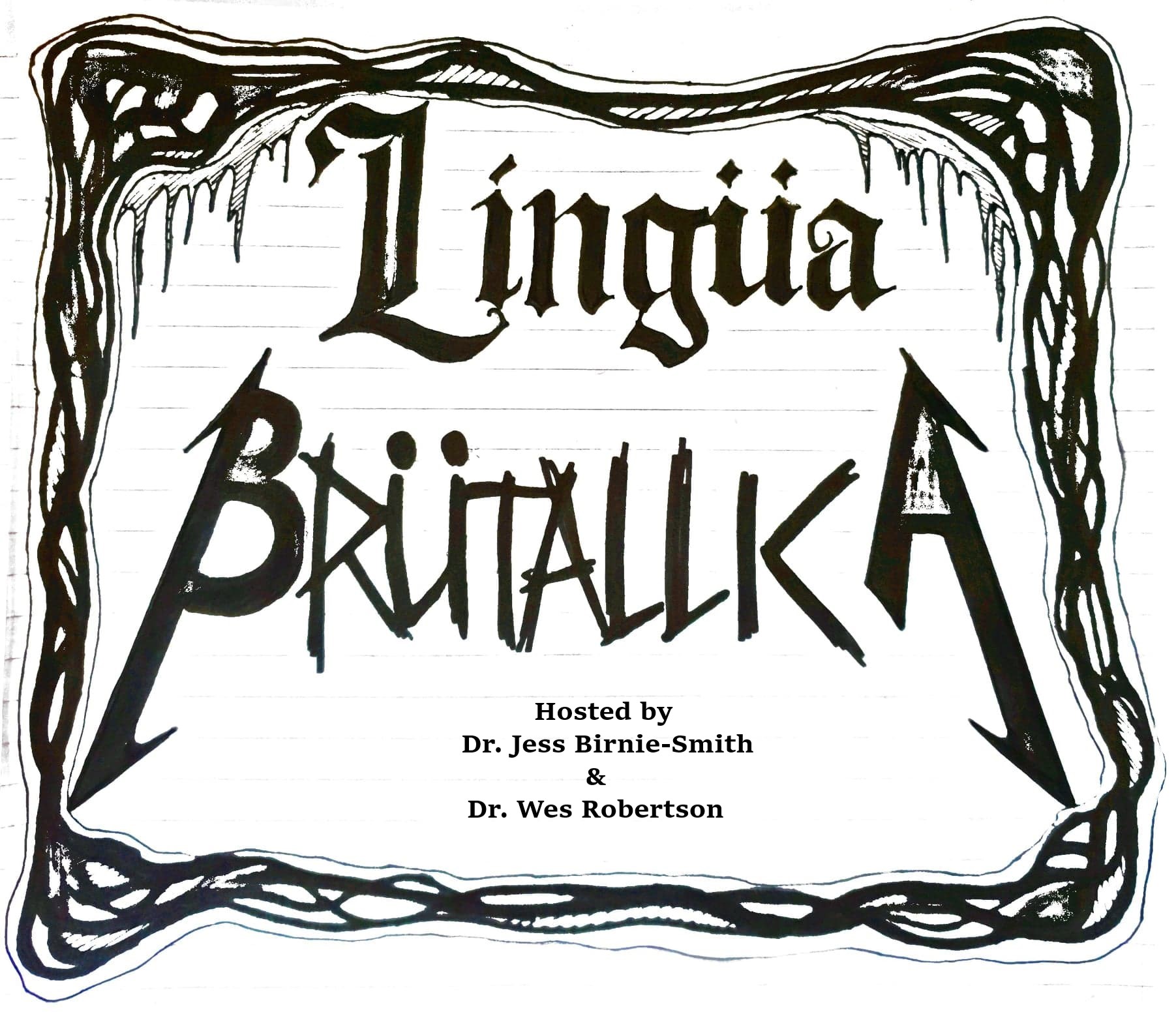Episodes

Sunday Mar 19, 2023
Lingüa Brütallica - Episode 37: Dan Cooley of Foretoken (Virginia, USA)
Sunday Mar 19, 2023
Sunday Mar 19, 2023
Episode 37 features Dan Cooley – vocalist of folk-inspired extreme metal project, Foretoken. In this episode, Dan takes us through the myths and legends, drawn from diverse contexts including Russian, Chinese, Greek, Norse, Irish and Persian cultures, that inspired lyrics composed for Foretoken’s two complementary albums – Ruins and Triumphs. Dan explains that these albums mirror the teachings derived from these folk stories, highlighting humanity’s setbacks and failures in the first instance, and their victories and accomplishments in the second. As a lyricist, Dan represents the origins of diverse folktales through carefully crafted language style. Specifically, Dan’s English-medium lyrics are written in a distinctively old-world style that is reflective of the historical origins of the myths, legends, and folktales he writes about. However, his lyrics are not constrained to English, by contrast, he takes pains to integrate non-English features into his lyrics, referencing the names for mythical figures and supernatural entities to composing entire lines in Spanish and Swedish. Further, his considerations for the language of lyrics extend beyond their sonic quality, as Dan highlights the importance of how the lyrics are presented in their written form in Foretoken’s lyric book. Collectively, Dan views all aspects of his work, including the lyrics, their vocal production, their written form, and even the lyric book they’re printed in, as part of the artwork that is Foretoken’s music. To check out all of Foretoken’s art, go to: https://lnk.to/Foretoken

Sunday Feb 26, 2023
Lingüa Brütallica - Episode 36: Chaney Crabb of Entheos (California, USA)
Sunday Feb 26, 2023
Sunday Feb 26, 2023
In this episode, we speak to progressive death metal vocalist Chaney Crabb about her work with Entheos. We begin by unpacking how Chaney's continual self-auditing has produced style shifts in her writing over time, starting with the staccato format of their first release (The Infinite Nothing) and moving to the more cohesive approach adopted for their latest release (Time will take us all). Chaney explains this transition to a more accessible lyrical style, combined with repetition of lines across songs and inclusion of clean vocals, are part of a coordinated effort to render her lyrics more coherent. The resulting enhanced visibility (and audibility) of Chaney's lyrics caused her to feel "more naked", with songs referencing her personal experiences and thoughts fully on display. And yet, Chaney does not feel a strong sense of ownership over her lyrics, elaborating that once the music is released, the interpretation and meaning derived from Entheos' work belongs to the listeners who create it.
To form your own interpretation of Entheos' forthcoming album, go to https://www.metalblade.com/entheos/ and follow them on https://www.facebook.com/entheosband/ and https://www.instagram.com/entheosofficial/?hl=en

Sunday Feb 05, 2023
Sunday Feb 05, 2023
This episode features vocalist Stan Liszewski of death-metal-leaning hardcore project Terminal Nation. Tackling capitalism, fascism, organised religion, and human destruction of the planet, Stan's lyrics focus on confronting real-world issues in our current society. Turning away from common metal themes of high fantasy and violent gore, Stan explains that he's more concerned with making his lyrics relatable to the listener. This aim is complemented by his minimalist and down-to-earth lyrical style, utilising a small selection of simple but striking vocabulary to convey ideas that are accessible to broad audiences. Moreover, Stan's use of repetition of key lines, peppered with the occasional swear word, create strong social and political messages that feel both authentic and genuine.
To keep up with Terminal Nation, follow them on socials: https://www.instagram.com/terminalnation/?hl=en ; https://twitter.com/terminalnation ; https://www.facebook.com/terminalnation/

Sunday Dec 18, 2022
Lingüa Brütallica - Episode 34: Mirai Kawashima of Sigh (Tokyo, Japan)
Sunday Dec 18, 2022
Sunday Dec 18, 2022
In this episode, we speak with Mirai Kawashima of Japan's legendary experimental black metal band, Sigh. Extracting influence from classical music, jazz, and even hip hop, Sigh's lyrics and music present a three-decades long exploration of Japanese religious stories, occultism and death. Mirai discusses how his perspective on these themes has changed over time, with his latest album Shiki marking a shift in his relationship to death as one that is more personal and real than ever. As a result, the lyrics for Shiki are written entirely in Japanese language, allowing Mirai to express his "naked feelings" in a way that wasn't possible in English. That said, Mirai also notes freedoms provided by English absent in Japanese, expressing a changing interest in the potentials of both languages over his decades long career.
To see more from Sigh, go to https://linktr.ee/sighofficial

Sunday Nov 27, 2022
Lingüa Brütallica - Episode 33: Nekrom of Heruka (Rome, Italy)
Sunday Nov 27, 2022
Sunday Nov 27, 2022
In this episode, we speak with vocalist Nekrom about Heruka's elegant black metal lyrics. Written in Italian language, Nekrom's lyrics typify the beauty of layered contrasts. First, the poetry of Heruka's lyrics, embodied in soft and fluid rhyme, contrasts with their vocal production, featuring harsh and distorted black metal screams. Moreover, Nekrom contrasts obscure and elegant Italian expression with the sometimes vile and grotesque subject matter of his lyrical content. Finally, Nekrom elucidates how the poetry of Heruka's lyrics is deeply inspired by both extreme metal's countercultural ethos as well as respect for history of great Italian art, architecture, poetry and song in the city of Rome. The sum of these contrasts is what Nekrom describes as "a beautiful painting" of Heruka's music.
To view this audible painting, go to: https://herukaproject.bandcamp.com/music and

Sunday Nov 06, 2022
Sunday Nov 06, 2022
In this episode, we discuss Misery Index's punk and grindcore-infused death metal, with their vocalist, Jason Netherton. Drawing on his working class background, Jason's lyrics pose questions about the capitalist system - in particular, who benefits from it and who is exploited by it. Singing from the collective 'we' perspective, Jason's lyrics draw a stark contrast with Western hyper-individualist society, instead emphasising the shared experience of exploitation under capitalism. However Jason's lyrics are not all despondent, his frequent references to history and mythology place his discussion of postmodern issues in a broader context, that not only offers greater insight into these problems, but invites hope for a better way of life.
To see more from Misery Index, go to https://www.miseryindex.com/

Sunday Oct 16, 2022
Lingüa Brütallica - Episode 31: Katie Davies of Pupil Slicer (London, UK)
Sunday Oct 16, 2022
Sunday Oct 16, 2022
Bringing us our first insight to the genre, in this episode we talk to Katie Davies about writing lyrics for mathcore. Moving away from the ocular dissection described on their EP, Katie's lyrics for Pupil Slicer's latest album, Mirrors, offer unexpected vulnerability detailing experiences of inner turmoil and psychological distress. Their stories written from the first person perspective, in straightforward, direct language, punctuated with occasional expletives, deliver profoundly poignant emotional impact. Katie explains that their intensely personal lyrics combined with mathcore's irregular time signatures, syncopated rhythms and unexpected tempo changes make for a performance that showcases a balance of technical proficiency and deep emotionality.
To experience this balance of the technical and the emotional visit pupilslicer.co.uk

Sunday Sep 25, 2022
Sunday Sep 25, 2022
Our interview in this episode focuses on the writing of drummer Jason Nitts and bassist Alex Damske - the dual lyricists of progressive death metal project Warforged. Focusing on the band's 2022 release The Grove: Sundial, Jason and Alex describe how, in taking over responsibility for Warforged's lyrics after the production of their first album, they were determined to challenge the established boundaries of their music, creating lyrics for their second album that are entirely distinct from those on their first. In contrast to the narrative-driven fantasy of their first album, the lyrics of The Grove: Sundial are firmly rooted in the real world, with repeated images of cars, houses, anger and self-contempt offering a sense of mundane brutality. The construction of this brutal domesticity realizes Jason and Alex's goal of avoiding metal language and typical metal themes, pushing the boundaries of what makes Warforged still a band and asking what can a metal band do? How far can you take that idea?
To explore the answers to these questions, visit: https://warforged.bandcamp.com/ and follow them on Twitter https://twitter.com/Warforgedband?s=20&t=LcImwAPlGtf85Ni_ISa8tw and Facebook https://www.facebook.com/warforgedband/

Sunday Sep 04, 2022
Sunday Sep 04, 2022
In this episode, we interview drummer and lyricist Vincent Tweten of death metal project Phobophilic, who presented some of the most diverse and thought provoking lyrical content we've yet discussed on this podcast. Vincent's lyrics address themes ranging from Lovecraftian horror to human consciousness and philosophy. Leading us through a brief introduction to absurdism and existentialism, Vincent explains that his lyrics, many of which include literal rhetorical questions, invite listeners to interrogate what human life is and what it means without the promise of easy answers. Though he often produces songs whose lyrical content is derived from personal experience, he generally prefers writing from a more depersonalised perspective that allows listeners to connect and take ownership of songs that might, if written from the first person perspective, read like someone else's story.
To listen to Phobophilic's music visit: https://phobophilic.bandcamp.com/, and follow them on Twitter https://mobile.twitter.com/phobophilic_ and Instagram https://www.instagram.com/phobophilic_/?hl=en .

Sunday Aug 14, 2022
Sunday Aug 14, 2022
This episode presents our first look at extreme metal in China by interviewing vocalist Lynn Wu and drummer Anthony Vanacore of convention-defying progressive metal band Ou. Drawing on Anthony's exceptional translation skills, we discuss how Ou's music and lyrics are born of a collaboration between Anthony's heavy musical roots and Lynn's background in popular rock. They explain the goal of this cooperation is to develop a unique musical approach that departs from the metal scene's Western English-language hegemony and typical sound. We discuss how Lynn's use of her native Chinese language allows her to draw on the aestheticism of traditional Chinese characters to create lyrics that appear literary and perhaps 'metal'. The resulting compositions explore opposing forces of dark and light, euphoria and existential dread from the viewpoint of an honest and objective observer. Lynn explains that such expressive lyrics are in part the product of the band's song titles, often consisting of only a single (occasionally obscure) character in length, which offer significant freedom to both lyricist and listener to create and interpret compositions.
To hear more from Ou, follow the band on Facebook https://www.facebook.com/ou.theband and Instagram https://www.instagram.com/ou.theband/?hl=en

